| Srl | Item |
| 1 |
ID:
132136
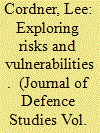

|
|
|
|
|
| Publication |
2014.
|
| Summary/Abstract |
Maritime security in the Indian Ocean Region (IOR) has become a central consideration. Shared risks and common vulnerabilities for state and non-state actors, generated by traditional and non-traditional security challenges, converge to a significant extent at sea. Risk-based approaches offer the potential for regional and extra-regional actors to engage in a constructive and non-confrontational dialogue that can assist collective security cooperation. Analyzing the evolving risk context, and assessing the risks and vulnerabilities, offers a sound basis for developing cooperative strategies for enhancing security in the maritime domain. Developing a regional strategic risk assessment, with a maritime security focus, should be a priority for IOR cooperative security entities. The Indian Ocean Rim Association (IORA) and the Indian Ocean Naval Symposium (IONS) could play significant roles in this work.
|
|
|
|
|
|
|
|
|
|
|
|
|
|
|
|
| 2 |
ID:
132142
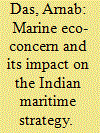

|
|
|
|
|
| Publication |
2014.
|
| Summary/Abstract |
Maritime strategic planning cannot be done in isolation of marine eco-concerns. Marine species are known to perceive the environment around them through acoustic signals, and depend on sound for numerous functions like foraging, communication and navigation. Noise as a pollutant has found scant reference in the United Nations Environmental Programme (UNEP) document of 1982-the United Nations Convention on the Laws of the Seas (UNCLOS). The International Maritime Organization (IMO) is yet to include noise as a pollutant in its 1978 MARPOL Convention. The enthusiasm for so-called economic growth and related activities in the absence of a regulatory framework encourages indiscriminate rise in such activities and the resultant increase in the anthropogenic noise, with disastrous impact on the acoustic habitat. A more inclusive maritime strategy is thus called for. In this article, the author presents a unique dimension for Indian maritime strategy.
|
|
|
|
|
|
|
|
|
|
|
|
|
|
|
|
| 3 |
ID:
132141
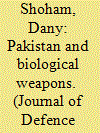

|
|
|
|
|
| Publication |
2014.
|
| Summary/Abstract |
Pakistan is a state party to the Biological Weapons Convention, yet at least part of its related outward conduct is rather exhibitory, aiming to foster the image of an obedient, sheer science- and protection-oriented profile. Although it is publicly accentuated that an ongoing Pakistani biological weapons (BW) programme cannot be proved, it is fairly clear that some Western intelligence agencies possess classified information that is highly supportive of such an active programme taking place in actuality. The biotechnological and biomedical infrastructures of Pakistan evidently enable such programme. An active BW programme in all likelihood commenced in Pakistan in the 1980s, and it possibly yielded a first generation BW arsenal by 1994. Otherwise, a first generation BW arsenal probably came into being during the second half of the 1990s or the first half of the 2000s. Ongoing development and upgrading have been observed, underlying a significant Pakistani subnuclear weapon of mass destruction capability.
|
|
|
|
|
|
|
|
|
|
|
|
|
|
|
|
| 4 |
ID:
132138
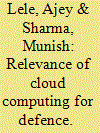

|
|
|
|
|
| Publication |
2014.
|
| Summary/Abstract |
Technology has always played the key role in defining the outcome of war. A modern-day military is investing in cutting-edge technologies to leverage their benefits in the evolving nature of warfare, which encompasses every aspect of science. In the case of information and communication technology (ICT), the research and development has unleashed vast potential for civilian and military applications, which vary from simple logic execution to high-end supercomputing. As cloud computing has made inroads in the operations of private sector, it is slated to perform a central role in the functioning of governments and defence and security agencies. Under the aegis of ICT, the emerging cloud computing can find applications in defence sector as it offers numerous advantages over traditional information technology (IT) systems such as scalability, agility and interoperability. The article is an attempt to identify the key defence operations where cloud computing could help in addressing the IT needs while keeping the acquisition and maintenance costs at minimal. It brings in the concerns and challenges lying ahead in the way of adopting cloud computing while taking stock of initiatives taken by the governments of leading militaries of the world.
|
|
|
|
|
|
|
|
|
|
|
|
|
|
|
|
| 5 |
ID:
132137
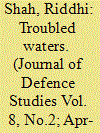

|
|
|
|
|
| Publication |
2014.
|
| Summary/Abstract |
The return of piracy to the Indian Ocean in modern times has culminated in the resurgence of the private violence industry in the maritime domain. For the first time in modern history, the private military security industry will work alongside traditional navies on the field. The dynamics between the two major security actors in the anti-piracy operations make for an interesting study. This article argues that there exists much potential for fruitful engagement between the two actors: PMSCs and navies. At the moment, however, long-held prejudices, in conjunction with ambiguity in the role of PMSCs in the anti-piracy operations and lack of structural variables, presents a formidable barrier to future PMSCNavy interaction.
|
|
|
|
|
|
|
|
|
|
|
|
|
|
|
|
| 6 |
ID:
132135
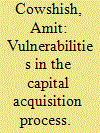

|
|
|
|
|
| Publication |
2014.
|
| Summary/Abstract |
From the stage of inception of a procurement proposal till the signing of the contract, the Ministry of Defence (MoD) diligently follows a fairly elaborate procurement procedure for capital acquisitions, as also for revenue procurements. The purpose of laying down a procedure is to minimize discretion and bring in transparency at every stage to eliminate the possibility of undue influence on decision making. But this does not seem to have worked very well for the MoD as instances of corruption keep surfacing every now and then.
|
|
|
|
|
|
|
|
|
|
|
|
|
|
|
|